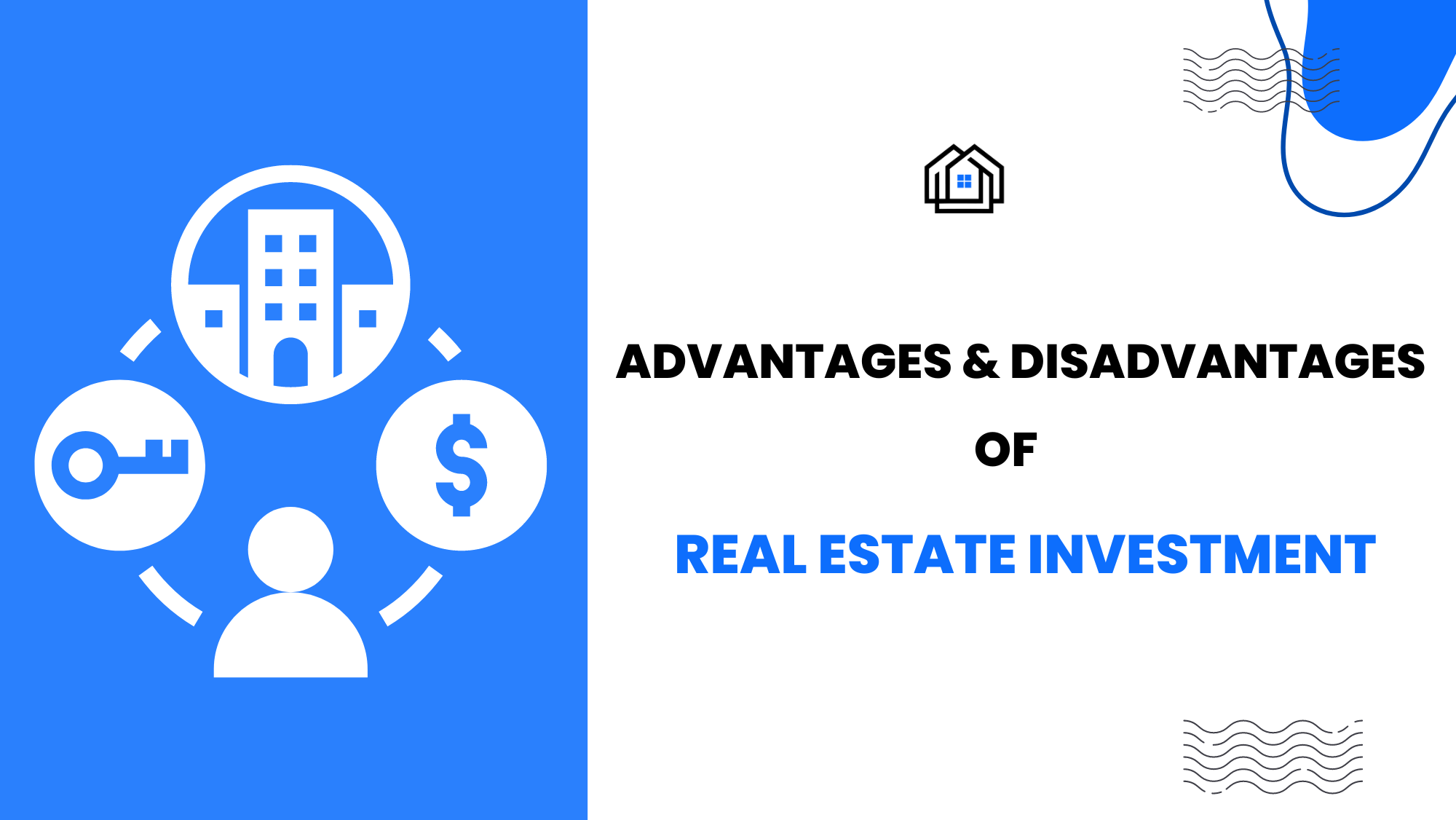Real estate investment is purchasing a property such as land, infrastructure, or building, among other tangible properties, to generate income rather than using them yourself.
It can be residential, commercial, industrial, or fixed and flip properties, among other real estate forms. There are many different ways to invest in real estate, including:
- House flipping
- Renting part of your house
- Investing in rental properties
- Buy real estate investment trust, etc
Real estate is the most rewarding niche, regardless of its form, since it constantly presents opportunities to forward-thinking developers and investors.
However, like other investments, real estate investment has pros and cons. Check them out.
Advantages of Real Estate Investments
1. A steady flow of income
There is an evident demand for residential housing, commercial buildings, and storage facilities such as go-down and warehouses. Whether you invest in residential or industrial real estate, you will always be assured of tenants.
You can earn a significant cash flow if done correctly regarding the location and type of rental houses you choose to invest in.
Additionally, you can reinvest the rental income to increase and diversify your investments. Most people who venture into real estate investments never stop investing.
In most cases, real estate investment is stable enough to pass from generation to generation.
2. Protection against inflation
Real estate is one of the few industries not impacted by inflation. As other industries struggle to survive, real estate investors, thrive.
How? Generally, rent is part of the cost of living and when it goes high, so do rent and home value. As a real estate investor, you enjoy increased income.
3. Create wealth and equity
One of the many benefits of investing in real estate is the ability to build equity. Once you acquire property, land, or a building, it naturally increases in value.
With equity, you have several options to generate income and get returns on your investment.
You can choose to sell the property and earn a profit or use it as leverage to acquire more property or diversify your investment portfolio.
4. Benefits the community
It is perfectly correct to focus on the financial indicators of any investment. However, residential real estate investment offers unquantified benefits to the community.
For example, improving the condition of rental houses and ensuring they are safe impacts the tenants’ lives.
Also, investing in new residential houses in areas with housing shortages helps reduce the hassles of house hunting. It also helps the residents avoid transport costs if they can find a home near their workplace or school.
Additionally, real estate investors create job opportunities for community members. As you hire sales agents, home inspectors, contractors, or construction people, you help stabilize their living standards. Some of them may eventually be your tenants or homebuyers.
5. Offers choices of investment options
Real estate offers a wide selection of investment opportunities. For example, you can venture into real estate development, property management, buying and selling land, house flipping, etc.
Although all real estate investments are rewarding, the right option depends on your financial stability, set goals, and target market.
Although the laws regulate the real estate industry, investors are in total control of the type of investment they venture into and how they use it to generate income.
This flexibility makes the real estate industry the most appealing.
6. An effective way to save for retirement
If real estate investment is done correctly, it forms a stable way of creating wealth. Suppose you are planning to save for retirement or your kids’ college studies; real estate investment is the best alternative to saving money in banks.
Although you can earn interest from saving with banks, real estate investment provides you with a significant flow of passive income.
Since no one knows their exact lifespan, no one also can tell how much they will need when they retire from work. Instead of depending on a pension, real estate investment can provide you with enough cash flow to maintain your lifestyle.
7. Tax benefits
Real estate investors benefit significantly from tax exemptions. E.g., rental income is not subjected to self-employment tax. Property owners also receive tax breaks on the following:
- Property depreciation
- Maintenance repairs
- Insurance
- Legal fee
- Property management
- Mortgage interest payments, etc
8. Freedom and flexibility
Financial gain is one of the many benefits of investing in real estate. However, there is a non-monetary benefit to financing real estate. For example, you can venture and be a highly successful real estate investor with or without professional education.
Additionally, real estate investment offers a freedom that most professional careers cannot offer. For example, you choose your work strategy and working hour.
Suppose you have an entrepreneurial spirit; you can invest in various ways. E.g., you can invest in land for sale, development, and flip houses.
Suppose you need more free time from work. In that case, you can invest in residential real estate and outsource management to property management companies—this freedom of deciding what to do and when is highly fulfilling, especially for entrepreneurial-minded people.
9. You are your own boss
The best part of investing is becoming your own decision-maker. With real estate investment, you fully control your work strategies, failures, and success. You choose the type of property you want to invest in, whom you will work with, and for how long.
In addition, investing allows you to choose how much you want to earn. For example, reinvesting the profit earned is a way of maximizing your income flow.
In other words, there is no limit on how much you can make. You keep investing as much as you have health and financial abilities.
10. High returns
The real estate industry has consistently outperformed other classes of assets. Also, unlike other investments whose returns are impacted by market performance, political instability, or inflation, real estate returns face minimal or no variances. As a result, it is the most stable source of consistent returns.
Also, real estate developers can decide how much investment returns they make. As a result, the same property type is staged at different prices by different developers.
Although real estate investment has many benefits compared to other asset classes, it has its share of cons; check them out.
Disadvantages of Real Estate Investments
1. Unpredictable real estate market
Real estate has proven resilient even during the recession and great pandemics making investors believe that the real estate market could only move upward. Although this is the case in normal circumstances, factors such as government policy, demographics, interest rates, etc., could lead to real estate depreciation.
You can avoid the risk of unforeseen market changes by conducting extensive research when buying the property and due diligence. Also, avoid buying a property at its peak price because if it were preceded by a bubble in property values that had sent the prices surging, you would experience a valuation decline in the long run.
2. Bad choice of location
Location is critical in real estate investment because you cannot move a house to a more desirable location. It determines the type of highly demanded properties, tenant pool, and rental rates.
To avoid getting stranded with a commercial building on an abandoned street, conduct thorough research on the best locations to invest in.
If you are inexperienced in the real estate industry, it would be best to consider assistance from more experienced realtors or friends.
3. High initial cost
One of the biggest challenges of real estate investment is the initial capital requirement. For example, you will need to provide a down payment, insurance, stamp duty, property tax, etc.
These costly requirements make it difficult to venture into the real estate business making many people resort to mortgages.
4. Unfavorable cash flow
You have a negative cash flow if your cash flow is less than your expenses (insurance taxes, mortgage, maintenance, etc.).
Negative cash flow causes include low rent charges, wrong choice of location, high cost of financing loans, costly maintenance, and high vacancy rates.
To avoid the risk of negative cash flow, you must conduct thorough research before purchasing a property and be realistic about the anticipated income. Also, choose a favorable location considering the tenant pool and rent rates.
5. Hidden structural defects
One of real estate investors’ biggest mistakes is underestimating the cost of structural repairs and maintenance. Investing in a poorly maintained building could be costly, especially with foundation, roofing, drainage, or siding repairs.
Investing in professional property inspection before purchasing property is prudent to mitigate the risk of incurring repair costs.
Suppose a structural defect is discovered, ensure that it is repaired or work the repair cost into your deal. If the problem discovered has the potential of becoming a major structural issue in the future, walk away from that deal. You will always find a better one.
6. Real estate lacks liquidity
Unlike in the stock market, where you can quickly sell them when you need to cash out, real estate investment has no liquidity. As a result, you might be forced to sell your property at a loss when you urgently need cash.
While there is almost nothing you can do to mitigate this risk, you can opt for a home equity loan (for residential rental property) or consider cash-out refinance (for commercial properties).
Alternatively, you can take a commercial equity loan rather than sell your property below its market value.
7. High rate of vacancy
If you invest in a rental property (residential or commercial), you must ensure that all the units are occupied to generate income. Unfortunately, real estate investment is constantly faced with the risk of vacancy. While the vacancy rate might not bother every investor, it becomes a real problem when you depend on the rental income to pay for expenses such as management, insurance, etc.
Some of the possible ways to lower the risk of a high vacancy rate include:
- Investing in a property with high demand
- Ensuring the correct choice of location
- Investing in advertisement and marketing of your property
- Keep your property clean and ideally maintained
- Keep your tenants comfortable by addressing their complaints and concerns
- List your property with professional real estate companies
8. Uncooperative tenants
Although, as an investor, you would do your best to avoid vacancy issues, uncooperative tenants can be more costly than having a vacant house. Some of the common problems with tenants include:
- Delayed rent payment
- Trashing the property
- Ignorance when it comes to the tenancy agreement
- Hosting more people or animals
- Failure to report maintenance issues when they arise
9. Legal difficulties
Real estate investment involves a lot of paperwork and tedious formalities, especially if you are into commercial real estate. Also, some states have land ceiling initiatives making the investment more difficult.
10. Not suitable for short-term investment
Real estate is a tangible asset that cannot be liquidated easily in urgent need of money. It is, therefore, not for you if you are looking for short-term investments.
Investing in real estate is a long-term strategy for building wealth and equity; making it a short-term investment could be costly since it requires high transactions.
However, betting too much on long-term appreciation value could be a great mistake. Why? Because if the property can’t pay for its expenses, it ceases to be an investment and becomes a liability.
To avoid making such a costly mistake, investing in an average neighborhood with high demand for houses would be financially prudent. It would fill up faster and start paying for its expenses, including mortgages if applicable.
11. Maintenance cost
A poorly maintained property is prone to depreciation due to damages caused by weather, calamities, sewer problems, mold, or bug infestation, among other causes. You would therefore require a reasonable amount of time and money to keep your property in excellent condition.
Suppose you have several properties; you will need a property management service which is an added expense. If the property management charges are not well-checked, they can take a significant amount from your cash flow.
Summary
Real estate investment is the most thriving industry globally, with plenty of opportunities, some of which are yet to be fully tapped. However, a mistake could lead to financial losses.



